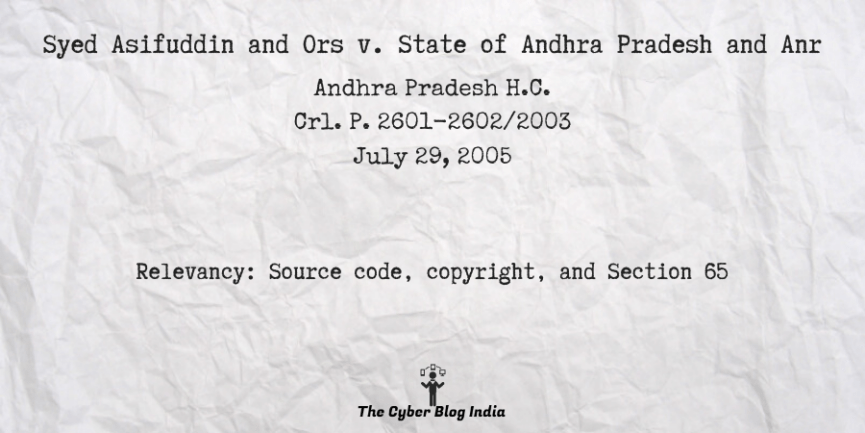Syed Asifuddin and Others v. State of Andhra Pradesh and Another

Syed Asifuddin and Others v. State of Andhra Pradesh and Another
2005 Cri LJ 4314
In the High Court of Andhra Pradesh
Cri. Pet. Nos. 2601 and 2602 of 2003
Before Justice V.V.S. Rao
Decided on July 29, 2005
Relevancy of the case: Source code, copyright, and Section 65 of the Information Technology Act, 2000.
Statutes & Provisions Involved
- The Information Technology Act, 2000 (Section 2(1), 65)
- The Indian Penal Code, 1860 (Section 409, 420, 120B)
- The Code of Criminal Procedure, 1973 (Section 482)
- The Copyright Act, 1957 (Section 63)
Relevant Facts of the Case
- Under the Dhirubhai Ambani Pioneer Scheme, the Reliance Infocomm Ltd., the second respondent, started a new offer where the company would sell a digital handset of the third generation model with some eye-catching tariff plans in the market where it would be available for Rs. 10,500 along with a payment of Rs. 3,350 for three years.
- This scheme attracted a lot of people to buy the phone due to which other service providers had to suffer losses. As a result, they started using illegal ways to improve their profit.
- TATA Indicom’s staff members, the petitioners, had tampered and hacked into the CDMA digital phones which belonged to the subscribers of the second respondent. This was done when the phone was brought to their store and by fraudulent means, they also attracted the customers of the second respondent by calling them and offering them better tariff plans. As per the terms and conditions, until a period of three years, the phone would belong to both, the second respondent’s company and the customer.
- On 31-5-2003, the respondent filed an FIR against the petitioners under Section 409, 120B, and 420 of the Indian Penal Code, 1860, Section 65 of the Information Technology Act, along with Section 63 of the Copyright Act.
- Two petitions praying the same relief were filed by the employees of TATA Indicom in 2005. The petitioners approached the court to quash the case filed by the respondent.
Prominent Arguments by the Advocates
Sri C. Padmanabha Reddy, Counsel for the Petitioner:
- It was argued that it’s always up to the customer whether to change the service provider or not. The handset brought to the petitioners by the customers of the respondent had the ability to provide two separate lines. It can also be started on a principle assignment mobile. Mere activation by the petitioners will not amount to a crime under Section 409 of the Indian Penal Code.
- It is also submitted by the learned counsel of the petitioner that the allegation of cheating the respondent dishonestly and deceitfully to retain the phone or to deliver it was not held against the petitioners. Therefore, there shall be no charges under Section 420 of the Indian Penal Code, 1860 since there was no cheating. Section 120B is also not applicable since it is misconceived. The counsel for the petitioner submitted that the telephone handset will not come under the definition of Section 65 of the Information Technology Act, 2000. A copyright infringement issue would not be raised since there was no allegation by the second respondent that they have a copyright of the source code.
D. Seshadri Naidu, Counsel for the Respondent:
- The court cannot quash the FIR before the investigation is completed as the offences committed by the petitioners were cognizable and several provisions from different statutes were involved. From the preliminary investigation report, the petitioners were found to be liable for the said offences. He also argued that the handset came under the definition of computer under the Information Technology Act, 2000.
Opinion of the Bench
- The court was of the opinion that when a computer source code has been managed by a phone operator, the computer source code can be used as evidence. Thus, the respondent can use the computer source code as evidence. The court held that the allegations against the petitioners under Section 65 of the Information Technology Act are made out. Hence, the offences under the Act cannot be quashed. Further, under Section 63 of the Copyright Act, 1957, a computer program will be considered as an original work according to Section 2(o)(ffc) and Section 14 of the Act.
Final Decision
- The petitions are dismissed.
- The investigation report has to be submitted by the police to the Metropolitan Magistrate within three months from the date of receipt of this order
This case summary has been prepared by Afsana Khan, an undergraduate student at Symbiosis Law School, Hyderabad, during her internship with The Cyber Blog India in June/July 2020.
